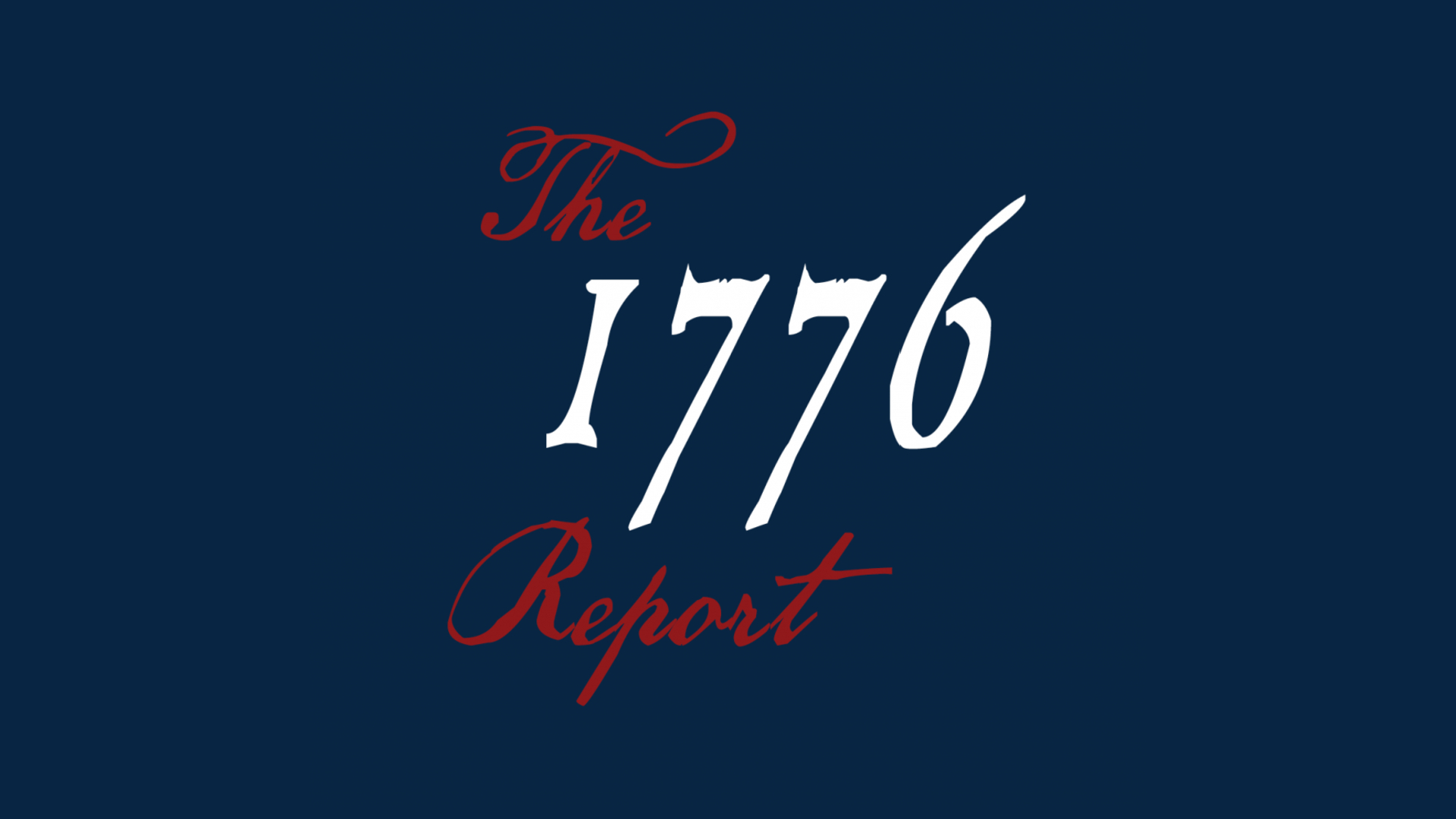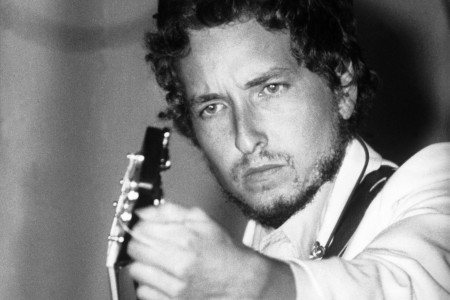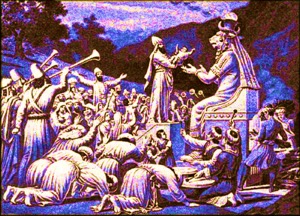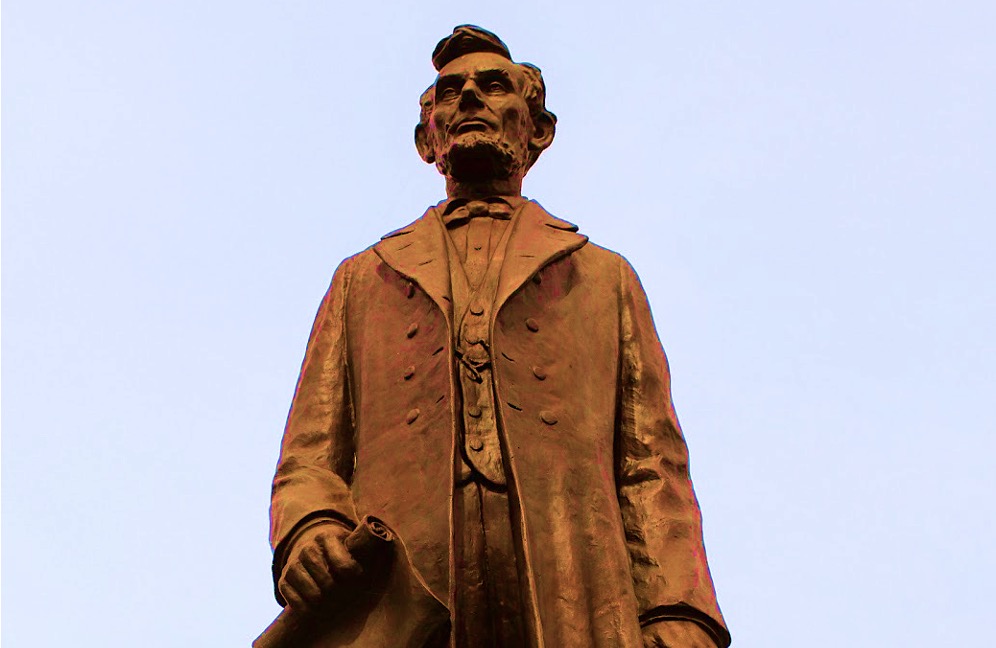Identity politics has taken the place of faith in American life. Why?
The 1776 Report: Faith and Liberty

An excerpt from the 1776 Commission's report.
Few essential principles of American life are more poorly understood than that of religious liberty. Using selective misreadings of our founding documents, generations of anti-religionists have used the Establishment Clause of our Constitution unjustly to chase religion from the public square and discredit it in the minds of the people. This is not merely ahistorical—it is foolish and reckless. Ironically, it has also left us with no resources to prevent the establishment of a new, if unacknowledged, civic religion whose practitioners preach racialism and perpetual grievance.
All members of President Biden’s team regularly insist that their leader is a faithful Catholic. But they have signaled their hostility to traditional religious principles from day one. Biden’s executive orders and sweeping policy agendas flatly defy the teachings of the Abrahamic faiths, and will make it still more difficult for believers in those faiths to live them out without fear of state encroachment.
In an Appendix to the 1776 Report, which the new administration was quick to erase from its website, President Trump’s commission thoroughly and succinctly dispenses with the idea that America’s founders devalued religion or thought the regime they built could survive without it. We present that appendix below; another excerpt from the main text can be found here, and the full report is preserved on the Claremont Institute’s website.
Faith and America’s Principles
History underscores the overwhelming importance of religious faith in American life, but some today see religious practice and political liberty to be in conflict and hold that religion is divisive and should be kept out of the public square. The founders of America held a very different view. They not only believed that all people have a right to religious liberty but also that religious faith is indispensable to the success of republican government. “The God who gave us life, gave us liberty at the same time,” Thomas Jefferson once wrote. “The hand of force may destroy, but cannot disjoin them.”
The idea that faith sustains the principles of equality and natural rights is deeply rooted in American society and proven through human experience. The social, political, and personal value of religious faith within America’s public space has been recognized and honored from the start. “Of all the dispositions and habits which lead to political prosperity, Religion and morality are indispensable supports,” George Washington observed in his Farewell Address. “In vain would that man claim the tribute of Patriotism, who should labor to subvert these great Pillars of human happiness, these firmest props of the duties of Men and citizens.” He went on to warn:
Let us with caution indulge the supposition, that morality can be maintained without religion. Whatever may be conceded to the influence of refined education on minds of peculiar structure, reason and experience both forbid us to expect that National morality can prevail in exclusion of religious principle.
Civil and Religious Liberty
By the time of the American founding, political life in the West had undergone two momentous changes. The first was the sundering of civil from religious law. Prior to the widespread adoption of Christianity, Western societies made no distinction between civil and religious law, between the demands of the state and the demands of the gods. Laws against murder and theft, for instance, had the same status as laws compelling religious observance, and all laws were enforced by the same political institutions. Pagan societies recognized no “private sphere” of conscience into which the state may not justly intrude.
Christianity overturned this unity by separating political from religious obligation and making the latter primarily a matter of faith, superintended by a church whose authority was extrinsic to civil law. Thus began a millennium of tension and conflict between secular and ecclesiastical authorities.
The second momentous change was the emergence of multiple sects within Christianity. In the pre-Christian world, all subjects or citizens of any given political community were expected to believe in and worship the same God or gods by the same rites and ceremonies. This basic unity held through the first several centuries of Christianity. But the Great Schism and, more significantly, the Reformation, undid Christian unity, which in turn greatly undermined political unity. Religious differences became sources of political conflict and war. The nations of Europe fell into internal sectarian divisions and external religious-political wars.
British monarchs not only disputed one another’s claims to the throne but imposed their preferred religious doctrines on the whole nation. Gruesome tortures and political imprisonments were common. The Puritans proclaimed a “commonwealth” which executed the Anglican king. The executed king’s son proceeded to supplant the “commonwealth,” but because his brother was suspected of being Catholic, Protestants expelled him in the so-called “Glorious Revolution” of 1688 that installed the Protestant monarch of the Netherlands and his wife as England’s king and queen.
In the 17th century, religious believers of many stripes came to North America as refugees from Europe’s religious persecutions. Ironically, the most famous attempt to form a separate religious community—the Pilgrims’ relocation to Massachusetts—eventually led to the core American principle of religious liberty.
The Founders’ Solution
The founders were ever mindful of the religious oppression and persecution that had existed throughout history. They knew that religious zeal often leads to the assumption that specific beliefs should be “established” by governments, meaning certain religious doctrines should be enforced by law as the official religion of the state.
Individuals who are not members of that religious body and do not accept its teachings often did not enjoy the same rights as a result. Discriminations against nonbelievers ranged from mild to the most awful, but the “establishment” of one religious body by government always divided the population into privileged and non-privileged classes, resulting in endless bitter struggles for religious dominance.
At the same time, the founders recognized man’s natural yearning to pursue the truth about God and freely practice the teachings inspired by those religious beliefs. They knew that religious beliefs, good for the ultimate happiness of the individual, were also good for politics because they encouraged the virtues (such as justice, self-restraint, courage, and truthfulness) necessary for self-government. To violate the consciences of citizens by using force to change their religious beliefs was a gross injustice. Violations of conscience by government would not strengthen the attachment of citizens to their government but would only foster hypocrisy, hatred, and rebellion.
The American founders did not claim to settle the ultimate questions of reason and revelation. But for the first time in history, the founders believed they saw a practicable and just alternative to religious persecution and conflict. Unlike previous forms of government, the Constitution they framed did not include the power to “establish” a national religion, and it specifically denied that anyone could be prevented from holding office by a “religious test.” They underlined this by expressly forbidding the federal government in the First Amendment from “establishing” any religion and, to make it even clearer, guaranteeing the free exercise of religion.
Together, these provisions give religious liberty primacy among the natural rights secured by our Constitution. This follows from the principles of the Declaration, as the foremost way individuals fulfill their well-being—in exercising their natural right to “the pursuit of happiness”—is through the religious teachings and institutions they believe and hope will lead to their salvation.
We often use the phrase “the separation of church and state” to refer to the founders’ practical settlement of these questions, but this phrase is usually misunderstood to mean a complete separation of religion and politics, which is a very different idea. When the founders denied government the power to establish a religion, they did not intend to expunge religion from political life but to make room for the religious beliefs and free expression of all citizens.
The Common Ground of Reason and Revelation
The founders emphasized where the moral teachings of religious faith and the ground of political liberty were in agreement. Just as they were confident that government has no theological expertise to decide the path to salvation, they were equally confident that a well-designed republican constitution is sanctioned by human nature and open to moral reasoning shared among human beings.
General moral precepts can be understood by human reason, and faith echoes these precepts. In other words, when the Declaration of Independence opens by appealing to “the Laws of Nature and of Nature’s God,” it means that there is a human morality accessible to both reason and revelation. This is the common moral ground of the American founding, where reason and revelation work together for civil and religious liberty. Consider this from the Reverend Samuel Cooper in 1780:
We want not, indeed, a special revelation from heaven to teach us that men are born equal and free; that no man has a natural claim of dominion over his neighbors…. These are the plain dictates of that reason and common sense with which the common parent of men has informed the human bosom. It is, however, a satisfaction to observe such everlasting maxims of equity confirmed, and impressed upon the consciences of men, by the instructions, precepts, and examples given us in the sacred oracles; one internal mark of their divine original, and that they come from him “who hath made of one blood all nations to dwell upon the face of the earth.” [Acts 17:26]
In proclaiming the self-evident truths of the Declaration, the founders interwove reason and revelation into America’s creed. One such truth is that there are fixed laws higher than those enacted by governments. Reason and faith secure limits on the reach of man-made laws, thereby opening up the space for civil and religious liberty.
Another is that, in the act of creation, however conceived, all came into existence as equals: the Creator gives no person or group a higher right to rule others without their agreement. Yet another is that all are gifted through their human nature with intrinsic rights which they cannot sign away, above all the great rights of “Life, Liberty, and the Pursuit of Happiness.” In all of these things, the founders limited the ends of government in order to open up the higher ends of man.
The purpose of the founders’ ingenious division of church and state was neither to weaken the importance of faith nor to set up a secular state, but to open up the public space of society to a common American morality.
Religious institutions, which were influential before the American Revolution, became powerful witnesses for the advancement of equality, freedom, opportunity, and human dignity.
- The American Revolution might not have taken place or succeeded without the moral ideas spread through the pulpits, sermons, and publications of Christian instructors. On the nation’s 150th Independence Day celebration, President Calvin Coolidge said that the principles of the Declaration of Independence were
found in the text, the sermons and the writings of the early colonial clergy who were earnestly undertaking to instruct their congregations in the great mystery of how to live. They preached equality because they believed in the fatherhood of God and the brotherhood of man. They justified freedom by the text that we are all created in the divine image, all partakers of the divine spirit.
- Even before the eighteenth century, Quakers and the faithful of other denominations, drawing on the Bible and on philosophy, began a crusade to abolish race-based slavery in the colonies. Anti-slavery literature was largely faith-based and spread through the free states via churches. One of the most famous anti-slavery writers in history, Harriet Beecher Stowe, was the devout daughter of a great American reformist clergyman and wife of a well-known theologian. Her worldwide best-seller, Uncle Tom’s Cabin, fired the moral indignation of millions that helped lay the ground for abolition.
- America’s greatest reform movements have been founded or promoted by religious leaders and laypersons reared in faithful home environments. Mother Elizabeth Ann Seton in the early nineteenth century set up orphanages and established free schools for poor girls. The tireless effort to end Jim Crow and extend civil and voting rights to African Americans and other minorities was driven by clergy and lay faithful of a multitude of denominations, including most prominently the Reverend Martin Luther King, Jr., who used nonviolent tactics to advocate for equal rights. The Pro-Life Movement today is led by clergy and the faithful of virtually every denomination.
- Local religious leaders have been a key buttress supporting our communities. Neighborhood and parish churches, temples, and mosques still are the strongest organized centers of help for the local poor, jobless, homeless, and families down on their luck. For generations, neighbors have assisted neighbors through church networks, helping the needy avoid the dehumanization of prolonged dependency on government welfare. Today, countless men and women actively feed and care for the poor, house and speak for immigrants and the disadvantaged, minister to jailed and released criminals, and advocate powerfully for a better society and a more peaceful world, supported by the charitable funding of Americans of all faiths.
- Clergy of various denominations have sacrificed career goals and risked their lives in order to minister to men and women serving in the armed forces. The brave soldiers who protect America against foreign dangers depend on the corps of military chaplains who help cultivate the warriors’ courage, inner strength, and perseverance they need to succeed in their missions. Religious chaplains open every session of Congress, and clergy pray at presidential inaugurals, state funerals, and other official occasions.
Conclusion
The United States has journeyed far since its founding. While the founders certainly had disagreements about the nature of religion, they had little doubt that faith was essential to the new experiment in self-government and republican constitutionalism. They knew that citizens who practiced the faith under the protection of religious liberty would support the Constitution that embodies their rights.
The shared morality of faithful citizens would sustain a republican culture that would foster stable family relationships and encourage important virtues like fortitude to defend the nation in war, self-restraint over physical appetites or lust for wealth, compassion toward neighbors and strangers in need, self-disciplined labor, intellectual integrity, independence from long-term reliance on private or public benefits, justice in all relationships, prudence in judging the common good, courage to defend their rights and liberties, and finally, piety towards the Creator whose favor determines the well-being of society.
We have arrived at a point where the most influential part of our nation finds these old faith-based virtues dangerous, useless, or perhaps even laughable. At the same time, many Americans feel that we have veered off the path that has brought so many happiness and success, and fear a growing factionalism cannot be overcome merely by electing a different president or political party. How can America overcome this partisan divide?
The answer to this rising concern must begin by frankly and humbly admitting that the common ground of equal natural rights on which our common morality is based is no longer visible to many Americans. We must refocus on the proposition that united this nation from the beginning: the proposition of the Declaration of Independence that there are “self-evident truths” which unite all Americans under a common creed.
But it is almost impossible to hold to this creed—which describes what and who we are—without reference to the Creator as the ultimate source of human equality and natural rights. This is the deepest reason why the founders saw faith as the key to good character as well as good citizenship, and why we must remain “one Nation under God, indivisible, with liberty and justice for all.”
The proposition of political equality is powerfully supported by biblical faith, which confirms that all human beings are equal in dignity and created in God’s image. Every form of religious faith is entitled to religious liberty, so long as all comprehend and sincerely assent to the fundamental principle that under “the Laws of Nature and of Nature’s God” all human beings are equally endowed with unalienable rights to life, liberty, and the pursuit of happiness. As the first American president wrote in 1790 to the Hebrew Congregation in Newport, Rhode Island:
The Citizens of the United States of America have a right to applaud themselves for having given to mankind examples of an enlarged and liberal policy: a policy worthy of imitation. All possess alike liberty of conscience and immunities of citizenship. It is now no more that toleration is spoken of, as if it was by the indulgence of one class of people, that another enjoyed the exercise of their inherent natural rights. For happily the Government of the United States, which gives to bigotry no sanction, to persecution no assistance, requires only that they who live under its protection should demean themselves as good citizens, in giving it on all occasions their effectual support.
The American Mind presents a range of perspectives. Views are writers’ own and do not necessarily represent those of The Claremont Institute.
The American Mind is a publication of the Claremont Institute, a non-profit 501(c)(3) organization, dedicated to restoring the principles of the American Founding to their rightful, preeminent authority in our national life. Interested in supporting our work? Gifts to the Claremont Institute are tax-deductible.
Today’s fraudulent multiculturalist faith fragments society—and fractures the psyche.
A new political vocabulary is needed for a world itself quite new.
Republicans need a new mission.
An excerpt from the 1776 Commission's report.




